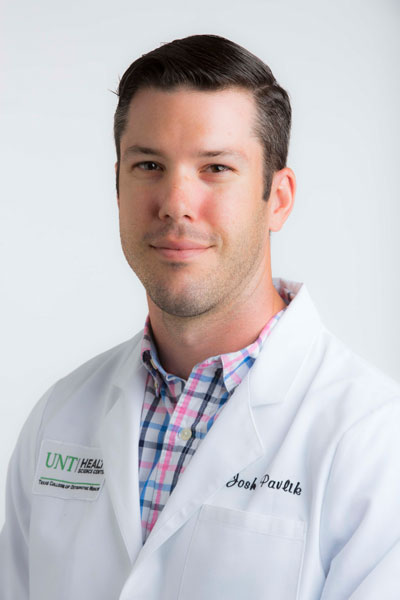Tourniquet training that stops bleeding and saves lives
By Alex Branch

Medical student Joshua Pavlik knows the value of a tourniquet in preventing someone from bleeding to death.
The former U.S. Army Special Forces medic used them to save the lives of U.S. military personnel in Afghanistan.
Now the third-year Texas College of Osteopathic Medicine student is teaching fellow students to properly apply tourniquets as part of UNT Health Science Center participation in Stop the Bleed, a U.S. Department of Homeland Security national awareness campaign to prevent bleeding deaths.
The program’s goal is essentially to make the skills to save someone from bleeding to death as prevalent as cardiopulmonary resuscitation (CPR).
“It’s a fairly simple technique that can be the difference between life and death,” Pavlik said. “But it has to be performed proficiently. The purpose of the program is to prepare people to stop bleeding quickly and correctly until emergency responders arrive.”
UNTHSC participation in the Stop the Bleed Campaign grew out of a pilot project started by Jeff Mott, DHSc, PA-C, to teach Critical Combat Care to Physician Assistant Students and campus law enforcement. The training is now part of the PA program curriculum.
Dr. Mott, Assistant Professor and Director of Clinical Education for the UNTHSC Physician Assistant Program, previously served in the U.S. Army and taught military medical personnel to apply tourniquets and other life-saving techniques before they deployed to combat.
A $25,000 grant from North Central Texas Trauma Regional Advisory Council allowed UNTHSC to purchase medical equipment, including tourniquets for students, faculty and campus police.
The training and equipment prepares students to save lives in the immediate aftermath of car crashes, large-scale disasters, terrorist attacks or mass shootings. Tourniquets were used to save lives at the scene of the Boston Marathon bombing.
A person can bleed to death in 5 minutes.
“We have 150 PA students with tourniquets in their backpacks who would be prepared to use them to save lives in an emergency,” Dr. Mott said. “The program is going strong.”
Pavlik and other Stop the Bleed volunteers have already trained 41 students from TCOM, the Graduate School of Biomedical Science and the UNT System College of Pharmacy. Pavlik said he hopes to establish reoccurring monthly training classes open to students, faculty and the public.
For more information on training opportunities, visit Lone Star Survival Texas Tourniquet Training on Orgsync.





Social media